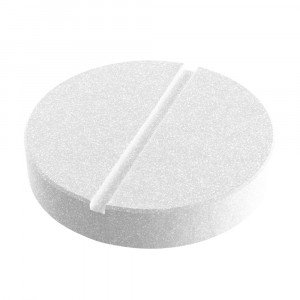 Welcome
Welcome
“May all be happy, may all be healed, may all be at peace and may no one ever suffer."
Renata Limited

Delentin 125mg

Generic for Diseases
- Hook Worm
- Tape Worm
- Rheumatic fever
- Ascariasis
- Enterobiasis
- Helminthiasis
- Trichinosis
- Worm infections
Pyrantel pamoate acts as a depolarizing neuromuscular blocking agent, thereby causing sudden contraction, followed by paralysis, of the helminths. This has the result of causing the worm to "lose its grip" on the intestinal wall and be passed out of the system by natural process. Since Pyrantel is poorly absorbed by the host's intestine, the host is unaffected by the small dosage of medication used. Spastic (tetanic) paralyzing agents, in particular pyrantel pamoate, may induce complete intestinal obstruction in a heavy worm load. This obstruction is usually in the form of a worm impaction and happens when a very small, but heavily parasitized animal is treated and tries to pass a large number of dislodged worms at once. Worms usually pass in normal stool or with diarrhea, straining, and occasional vomiting.
This medication is used to treat intestinal worm infections such as pinworm, roundworm, and hookworm. Pyrantel belongs to a class of drugs known as anthelmintics. It works by making the worms unable to move (paralyzed) so that the body can remove them naturally in the stool.
Pyrantel Pamoate is specifically indicated for the treatment of infestations caused by Ascaris lumbricoides, Enterobius vermicularis, Ancylostoma duodenale/Necator americanus and Trichostrongylus.
This medication may be used to self-treat pinworm infections. For other types of worm infections (such as roundworm, hookworm), use this product only as directed by your doctor. Do not use this medication in children younger than 2 years unless directed by the doctor.
Pyrantel Pamoate is given orally at anytime without regard to ingestion of food or beverages. A single dose of 11 mg/kg body weight, to a maximum of 1 gm, should be given to treat infestations caused by the parasites mentioned above. In the case of Pinworm, it is often wise to repeat the dose after an interval of 2 weeks.
Known hypersensitivity to pyrantel or any ingredient in the formulation.
Pyrantel Pamoate is well tolerated in recommended dosage. When given in large dosage, Pyrantel Pamoate may cause gastrointestinal upset such as anorexia, nausea, vomiting and diarrhoea. Other side effects that may occur in rare occasions are headache, dizziness and rash.
Since Pyrantel Pamoate and Piperazine appear to be mutually antagonistic, Pyrantel Pamoate should not be given together with Piperazine. Pyrantel Pamoate should be kept out of the reach of children.
Use in Special Populations
Pediatric Use: Safety and efficacy not established in children <2 years of age;a use in this age group only when potential benefits justify possible risks.
Hepatic Impairment: Use with caution in patients with preexisting liver dysfunction.
Pregnancy & Lactation
Pregnancy: Since Pyrantel Pamoate has not been studied in pregnant women, use of Pyrantel Pamoate in such patients is normally contraindicated. Pyrantel Pamoate is not recommended for children below 1 year of age.
Delentin 125mg and more Available Brands
Rolac MDT 10mg
Calcin-O Kit 150mg + 40...
Renamycin 250mg
Proxid 6mg + 200m...
Thiontal 500mg / vi...
Domiren 5mg / 5ml
Calciferol 200000IU /...
Gaba 300mg
...
To be happy, beautiful, healthy, wealthy, hale and long-lived stay with DM3S.